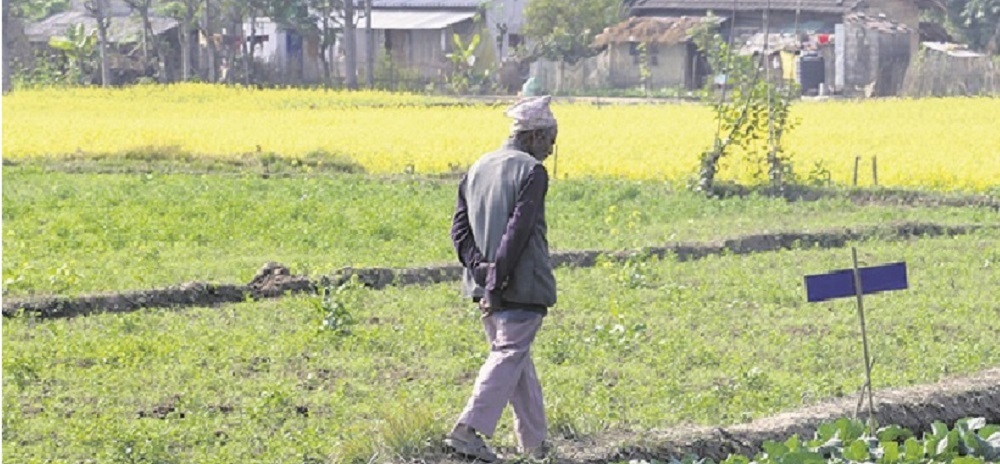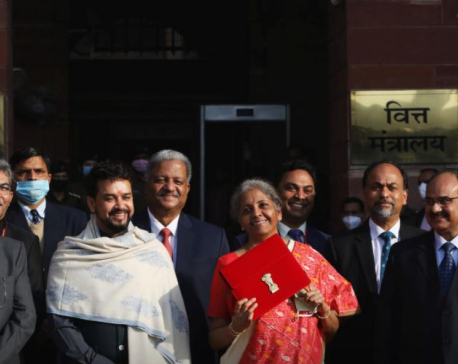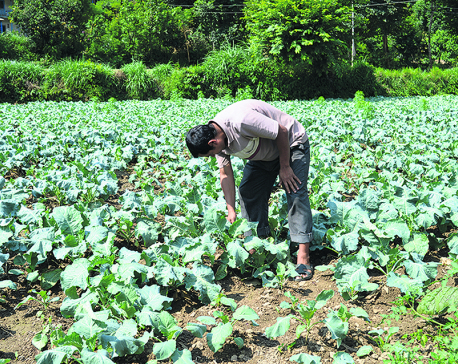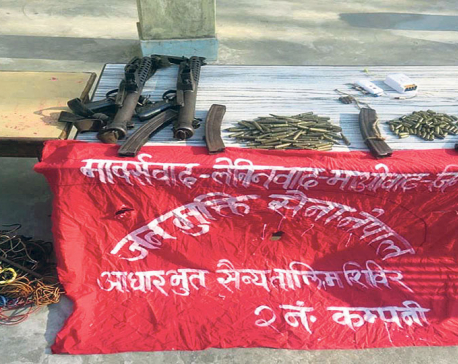
OR
#Reimagining Nepal


Shanta B. Dixit
Dixit is a Lalitpur-based educator with a doctorate in public health.dixitshanta@gmail.com
More from Author
We must use our resources to our maximum, equitable and long-term benefit, establishing strong agriculture, healthcare, education, and local livelihoods, and protecting natural environments
The coronavirus pandemic is forcing Nepalis to rethink the path of development. We are entering a new reality of frequent global pandemics and of ensuing recessions in which each society must seek to meet its own basic needs. At this time, there is a lot that we Nepalis can learn from the way we have, until just recently, been.
We must become a country that focuses on agriculture and is self-sustaining in food production. A country that was until a few decades ago an exporter of grain, where 90 percent of the population farmed for a living, imported paddy worth 32.5 billion rupees in the FY 2018/19. In a future in which we may have to shut our borders to flatten the curves of various viral infections, dependency on food imports is no longer viable.
We are blessed that until just two decades ago, farming was the mainstay of our population, and we have not lost our connection to the soil. But in order to ensure the possibility of fulfilling lives in the villages, where the farming is done, it is essential that high-quality basic services, including healthcare and education, are available. In a post-pandemic world, we can no longer depend on tourism or remittances to lift us out of poverty. Instead, we must build an economy whose center of gravity lies within the country itself. In order to do this, here are some of the things we need.
Food production
Scientists tell us that global pandemics like that of COVID-19 will be more frequent in coming years. If we have to regulate our borders on a regular basis to dampen the spread of infection, then it is essential that we become self-sustaining in food production. Minister for Agriculture and Livestock Ghanashyam Bhusal has warned that we do not have enough food in reserve to last us more than a few months and that, if import of foodstuffs becomes either unavailable or unaffordable, Nepal may soon face famine.
This frightening state of affairs makes it clear that we must be self-reliant in food production. This should be the case both nationally and locally, with village farmers meeting the majority of their villages’ needs. Individually, too, we should start growing our own food, even in pots on balconies and rooftops in the cities. For one, this means that we will get to consume fresh produce. Additionally, research shows that farming (working with mud) has myriad health benefits, including being a natural antidepressant.
Nepal is blessed with a wide range of topographies and climates, and this means that foods from all over the world grow here. Before the COVID-19 pandemic, some might have thought to export sought-after super-foods such as amaranth, millet, quinoa, chia seeds and flax seeds. Now, given the recession that will follow the pandemic, export markets will be down, and this is a great opportunity to make sure that we focus instead on feeding our own population well. Our soil will give us enough, both to feed ourselves and to share with the world, but our first priority should be to meet our own need for quality nutrition. An emphasis on nutrition in pregnant women and young children, particularly of vulnerable population groups, will help us to correct the prevalence of debilitating malnutrition amongst our young, which has long-term consequences for each child and for the country.
A nutritious traditional diet of dal-bhat, dhindo or roti with varied tarkari, achaar, dahi, ghiu, and the local fruit of the season, must be accessible to everyone. We must do away with highly processed foods and junk food. We should work hard to become a society in which people always have the time to enjoy cooking, because this is an essential component of a grounded existence and also ensures each family’s continued agency over what it consumes.
While these are truths that hold true at all times, we are currently facing the possibility of a famine as the food system on which we in recent years have relied upon has been disrupted. It is therefore crucial that food production becomes everyone’s priority and that everyone is able to start growing food in whatever way they can. We are fortunate that the coronavirus lockdown coincides with the spring planting season and that most of us are home and able to work on whatever patch of earth is available to us. Corn, squash, beans and okra planted now, for instance, will be ready to harvest in just two to three months and this will ease the food scarcity that we are expecting to face at that time.
Safe, sustainable agriculture
Our traditional farming techniques, still practiced in many parts of Nepal, are healthy for us and for the environment, and they can be refined with insights from agro-ecological research. Globally, the legacy of the Green Revolution of the 1950s and 1960s has included erosion and loss of fertility of soil, environmental and soil toxicity, increased demand on water, and the loss of multi-cropping traditions that maintained soil fertility. It is worrisome that dominant trends of thought in agriculture in Nepal today continue to be influenced by these approaches, which were developed for large-scale commercial agriculture in the West.
Not only do we need to assess whether these approaches are applicable to a country of small farmers, but we must also determine whether they facilitate long-term soil health. We need to closely examine developmentalist approaches while also studying traditional and newer agro-ecological farming methods and make informed decisions as to what is necessary in terms of mechanization, irrigation and agricultural inputs.
While chemical pesticides rid crops of pests and control weeds in the short term, the harms they inflict far outweigh the benefits they bring. Use of these poisons is harmful to both farmers and consumers, causing over time a range of health problems. It is also harmful to all other forms of life that come into contact with these chemicals, from large animals like vultures, deer and fish, to pollinators like bees and butterflies, to the life forms that make our soil fertile like earthworms, nematodes, and microbes. Pesticides contaminate surface water, ground water, and the soil. By killing living organisms in the soil, they deplete soil organic matter and this, over time, makes the soil infertile. Already in many parts of Nepal, the soil is significantly degraded and in need of restoration. It is high time that we turn to sustainable, organic farming methods en masse.
In order for Nepal to be truly independent in its agricultural production, we must restrict the import of agricultural inputs, including seeds. We need to study the benefits and drawbacks of hybrid seeds and make our own informed decisions on whether they are necessary. We must be wary of any influence exerted on policymakers by agribusinesses that seek to sell us these seeds. Agro-ecology tells us that our own heirloom seeds, saved by farmers from year to year, are the ones that are best suited to our soil and climate. Nepal’s dependence on hybrid seeds has already caused many indigenous varieties to go extinct, and this ongoing loss of crop biodiversity is dangerous and irreversible. It also means we are losing the best of our agricultural wealth and heritage.
In the budget speech for FY 2019-20, the Government of Nepal stated its commitment to encouraging organic agriculture in all seven provinces, emphasizing it especially in hill districts and the Karnali. The government expects large-scale biogas plants to reduce our dependence on imported LPG gas, and wants to encourage youth returning from foreign employment who have experience in agriculture to start organic farming businesses. This commitment to organic farming is important. What we now need to see is strategy and implementation.
Youth to the farm
Even before the COVID-19, it was known that jobs in the Gulf and Malaysia were starting to dry up and that even youth already working there were beginning to return home. The pandemic will speed up this process. Young women and men returning is the best thing that could happen for Nepal. Given the opportunity, with their best years, youth can build their lives. It is the building of each of these lives that, in itself, constitutes the building of the nation.
Other than air and water, food is the only thing that everybody needs. Food production is thus the most secure form of employment for our young people returning home, many of whom still have family farms. People able to farm food tend not to go hungry and excess produce can be sold to others. It is thus with excellent timing that the government has articulated its commitment to encourage returnees to become involved in organic farming.
At the moment, middlemen who take farmers’ produce to market take a disproportionate share of the revenue for themselves and thereby making farming an unattractive profession. It is important that farmer’s cooperatives take over this role, thereby ensuring that the producers get a fair price for their crops. Nepal’s Constitution refers to cooperatives as the third leg of the economy (the other two being the government and the private sector), and the cooperative movement has the ability to lead the country’s return to sustainable agriculture.
The government, for its part, should be involved in setting prices so that farmers are encouraged to continue farming. Also, if Nepal is to be self-sufficient in food production, then the government should have a policy of not importing essential food items that can be grown here. An example is onion farming, in which cheap imports have discouraged domestic production. The provision of the cheapest available import foods undermines both the farmer’s right to farm and Nepal’s right to food security through self-sufficiency. There are more important things than rock-bottom prices, as COVID-19 has made clear to us.
Across Nepal, agriculture can provide the cornerstone for thriving village economies. Strong local agriculture creates jobs not only for farmers, the people who take food to market, and the people who process it (eg. milling flour, making gundruk, drying herbs, preserving fruit), but also for people involved in a range of other services. A robust village economy will be better able to support carpenters, tailors, electricians, artisans, and many others.
Healthcare and Education
Agriculture, education, and healthcare tend to be seen as distinct sectors and planning for each takes place separately. This, however, is not an effective approach. A realistic appreciation of how life works and a commitment to optimal use of resources both require us to see these services and domains of life as integrated and inseparable.
In order for us to become a thriving nation of farmers, there are basic and essential services that must be available in every village of the country. Quality healthcare and education must be provided in all wards. This will be made possible by the current decentralization of the Nepali state under the 2015 Constitution and the election in particular of local representatives who can be held accountable by their constituents.
At the moment, Nepal’s healthcare system is centralized in Kathmandu, as has been highlighted by the COVID-19 crisis. Even until the start of the current lockdown, the testing facilities for the coronavirus were located only in the capital. This shocking state of affairs unfortunately reflects a longstanding reality of our healthcare system. Our people deserve health care that actually reaches them, with adequate resources (human and physical) at the ward, municipality, and province levels. If this is not provided, a good quality of life in the villages is simply impossible.
The commitments with regards to health laid out in our Constitution and in the attendant legislation must be implemented. We must focus on prevention of disease through quality nutrition, an unpolluted environment including clean air and water, and a strong understanding of personal hygiene and effective home remedies, in which our culture is rich. And we must have well-equipped health facilities at all levels. Every person counts, every person is vulnerable, and every person needs access to curative care.
Lack of quality education in the villages has been a major factor in driving both migration to the cities and labor migration overseas. Families have been torn apart, with only the elderly remaining in the villages and with children in the cities not receiving the care of the many who would have raised them back home. The government has worked hard to build schoolhouses throughout the country and it has declared education free and compulsory. However, village schools tend to provide a low quality of instruction and so young, exposed parents will not want to enroll their children there. It is inevitable that massive out-migration from the villages results in a decline in agriculture.
What kind of education is meaningful for the children of Nepal? What kind of education, when made available in the villages, will encourage families to remain and will help people to lead comfortable lives there? This will be a holistic education in which children learn to appreciate and take pride in their immediate surroundings and in which they learn by doing. It will be a developmentally appropriate education facilitated by trained professionals who love children. It will look out for the well-being of each child, nurturing community-minded young citizens who know their value, who think for themselves, and who show kindness to others. A valuable education will be one that teaches children to be aware of the possibilities in their home districts and their country and gives them the skills to harness these opportunities.
The thriving village
Aside from education and healthcare, villages will need a steady supply of electricity, much of which can be produced through small hydro, solar, and wind power plants that cause minimum environmental damage. They will need internet access, libraries, sports facilities and community-based supports of all kinds. Once village economies begin to thrive, enterprising citizens will create these and much more. The work of supporting agriculture and ward-based education and healthcare needs to be done to get rural economies to this point.
If Nepalis are fully self-sufficient, we will not be impacted by epidemics at the scale at which we are when we are dependent on foreign employment, tourism and imports. Neither will our economy suffer as much when epidemics bring the globe to a standstill or when they plunge it into recession. Furthermore, we will not be dependent on foreign funding and thereby less vulnerable to direct and indirect intervention. We will be truly sovereign.
We must use our resources to our maximum, equitable and long-term benefit, establishing strong agriculture, healthcare, education and local livelihoods, and protecting natural environments. In doing this, we will ensure a high quality of life for all of our people. We will furthermore be able to share with a world on the edge of destruction what it means to live well.
Dixit is a Lalitpur-based educator with a doctorate in public health. She can be contacted at dixitshanta@gmail.com
You May Like This

Highlights: India unveils budget aimed at boosting pandemic-hit economy
NEW DELHI, Feb 1: Indian Finance Minister Nirmala Sitharaman on Monday unveiled the budget for fiscal 2021-22, that aims to... Read More...

How to attract young people to farming?
Agriculture needs to be modernized and commercialized to ensure the country’s sustainable food security. This is only possible if we... Read More...

Govt restricts Chand group’s activities
KATHMANDU, March 13: The government on Tuesday outlawed the ‘political activities’ of the semi-underground Communist Party of Nepal led by... Read More...











Just In
- Challenges Confronting the New Coalition
- NRB introduces cautiously flexible measures to address ongoing slowdown in various economic sectors
- Forced Covid-19 cremations: is it too late for redemption?
- NRB to provide collateral-free loans to foreign employment seekers
- NEB to publish Grade 12 results next week
- Body handover begins; Relatives remain dissatisfied with insurance, compensation amount
- NC defers its plan to join Koshi govt
- NRB to review microfinance loan interest rate







Leave A Comment